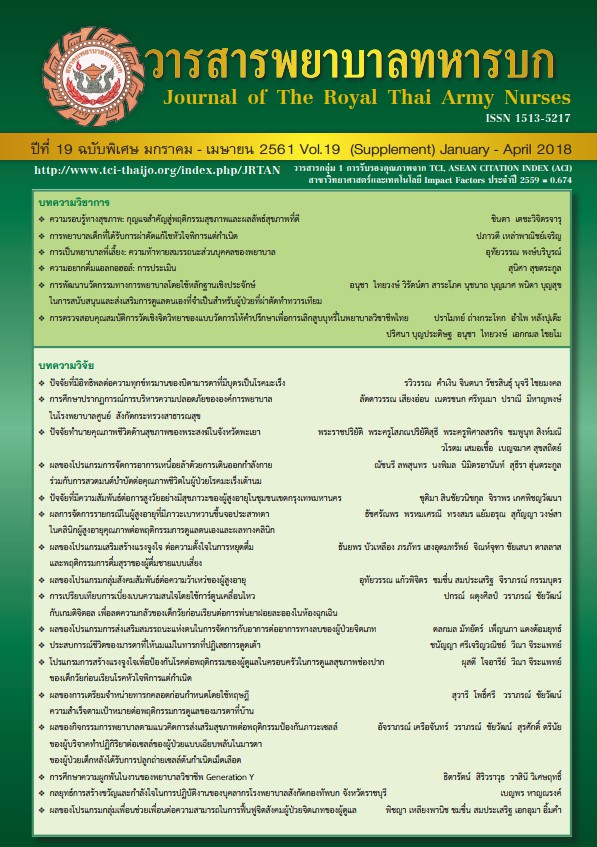Effects of Pain Education Program on Nurses’ Knowledge And Pain Management in Surgical Critical Patients
Keywords:
Education Program, Pain Management, Pain Assessment and Management, Surgical Critical PatientsAbstract
The research aimed to investigate the effectiveness of pain education program on nurses’knowledge and pain management in surgical critical patients based on learning theory by Bloom. The participants were 25 Surgical Intensive Care Unit (SICU) nurses who had worked at Somdejprapinklao Hospital. Data were collected from June 2017 to July 2017. The instruments included a questionnaire of nurses’ knowledge about pain assessment and pain management in postoperative surgical critical patients. Nurses’ knowledge was measured before and after the educational program of pain assessment and management. Moreover, the observational checklist was used to evaluate nursing pain management in the medical records. Data were analyzed using descriptive statistics of frequency, percentage, mean, and standard deviation, as well as inferential statistics one-way repeated measure. The findings of the study showed that the 25 SICU nurses had significantly increased knowledge after attending an educational program. After 4 weeks of educational program, the nurses recorded level of pain, sedation score, pharmacology and non pharmacology used. In addition, the nurses used the appropriate instrument to evaluate level of pain. In conclusion, the educational program could be used to promote nurses’ knowledge of pain management to improve the quality of care in postoperative surgical critical patients.
Downloads
References
2. Dele C, Fraser M, Haslam L, Knechtel L, Mc Gillion M, et al. Survey of assessment and management of pain for critically ill adults. Intensive Crit Care Nurs 2011; 27(3): 121-128.
3. Sikorski KA, Barker DM. Clients with pain. Medical-surgical nursing: Clinical management for positive outcome. 7th ed. St. Louis: Elsevier Saunders; 2005.
4. Cade CH. Clinical tools for the assessment of pain in sedated critically ill adults. British Association of Critical Care Nurses 2008; 13, 288-297.
5. Rahu MA., Grab MJ. Facial expression and pain in the critically ill non-communicative patient: State of science review. Int Crit Care Nurs 2010;
26(6): 343-52.
6. Cornor LO. Critical care nurses’s judgement of pain status : A case study design. Int Crit Care Nurs 2012; 28(4): 215-223.
7. Warangkana A. Pain Management in critically ill patients : Challenge’s role for Nurse. Journal of Nursing and Education. 2015; 8(2): 1-8. (in Thai)
8. Bloom B. Taxonomy of educational objectives: The classification of educational goals: Handbook I : Cognitive domain. New York: David McKay 1964.
9. Jeffries PR, Norton B. Selecting learning experiences to achieve curriculum outcomes. St. Louis: Elsevier Saunders 2005; 2: 187-212.
10. Daoruang B, Kanogsunthornrat N, Junhavat D. The effects of a post-operative orthopedic pain management program on nurses’ knowledge, patients’ perception on nursing practice and pain management outcomes. Rama NursJ 2012; 18(3): 358-370. (in Thai)
11. Sarinrat W, Nantiya S. Effects of a Nursing Skills Enhancement Program on Knowledge and Confidence in Nursing Students Enrolling in Nursing Care of Adult and Aging Practicum ll. Journal of The Royal Thai Army Nurses 2017; 18(1): 157-165. (in Thai)
12. Olsen FB, Rustoen T, Sandvik L, Miaskowski C, Jacobsen M, Valeberg TB. Development of a pain management algorithm for intensive care units. Heart & Lung 2015; 44: 521-527.
Downloads
Published
How to Cite
Issue
Section
License
บทความหรือข้อคิดเห็นใดใดที่ปรากฏในวารสารพยาบาลทหารบกเป็นวรรณกรรมของผู้เขียน ซึ่งบรรณาธิการหรือสมาคมพยาบาลทหารบก ไม่จำเป็นต้องเห็นด้วย
บทความที่ได้รับการตีพิมพ์เป็นลิขสิทธิ์ของวารสารพยาบาลทหารบก
The ideas and opinions expressed in the Journal of The Royal Thai Army Nurses are those of the authors and not necessarily those
of the editor or Royal Thai Army Nurses Association.






